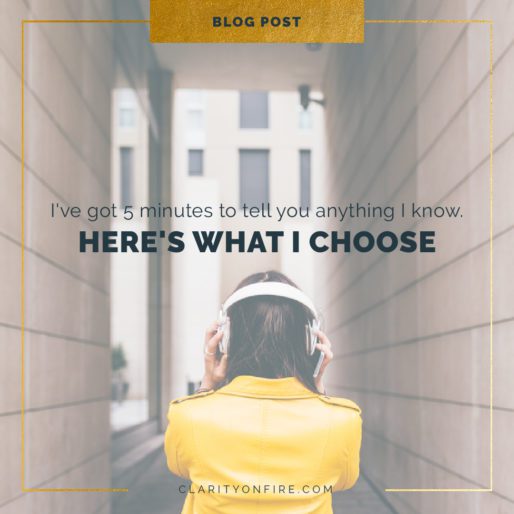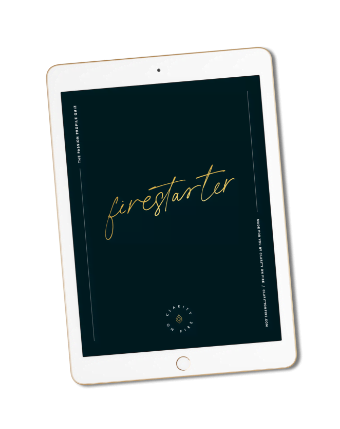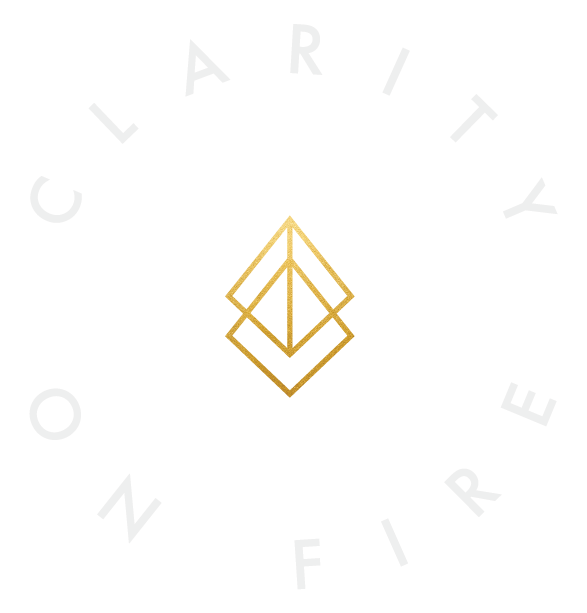If reading long blogs just isn’t your deal, you can listen to me read it instead!
(Click the orange play button to start playing right here on the page, or download and save it for later by clicking the downward arrow at the top right of the box below.)
When I was 3 years old, you could often find me perched in my booster seat, gathered around the kitchen table with my parents and baby brother, offering proclamations from on high.
I was fond of beginning any statement with, “As you know, Mommy…” or “As you know, Daddy…” What came next was probably standard for a 3-year-old, “As you know, Mommy, I ate all my spaghetti.” Or, “As you know, Daddy, I colored a picture of a dog today.”
I wasn’t sharing any earth-shattering revelations, but when I spoke, I did so with the slightly patronizing air of a true know-it-all.
And nothing much changed for the next 20 years.
I have always loved being right. Going to school only hammered this home for me; I was a real hand-in-the-air-24-7 Hermione Granger type, and because I was a good student, I got praised for being right.
And because I’ve never been shy about sharing my opinions, nor afraid of conflict, I was happy to tell anyone how right I was, and consequently how wrong they were.
It’s nice to be right, isn’t it? It feels good. You’ve got the moral high ground, and everyone else is just woefully inaccurate or brazenly stupid.
But … here’s the problem. There really is no such thing as “right.” There’s also no such thing as “wrong.”
What I’m about to share is one of the most important things I’ve had to learn in the past decade of my life. If I only had 5 minutes to tell you anything in the world, this is what I would want you to know. It’s that critical, especially in 2017.
LABELS, LABELS EVERYWHERE
Let’s back up to being 3 years old.
For all of us, this is when our vocabulary starts to explode and we can finally communicate with the adults around us in a more sophisticated way.
When we’re little, one of the first things we learn is the value of sorting the world in order to make sense of it:
- This is a dog. That is not a dog. It’s a cat.
- This weather is sunny. That weather is rainy. Therefore, it’s not sunny.
- What does the cow say? Moo! What does the duck say? Quack! If it’s quacking, it’s definitely not a cow.
- This is an apple. It’s food, so we’re allowed to eat that. This is a marker. We are not allowed to eat that because it’s not food.
This makes perfect sense. How in the world are you ever going to learn what something is if you don’t have a point of comparison?
And of course, labeling things in an “either/or,” “right/wrong,” “good/bad” way keeps us safe, too. We learn that it’s right to look both ways before crossing the street, and wrong to talk to strangers. It’s good to eat your vegetables and bad to put your hands in the toilet.
But there’s a HUGE problem with this: Most of us get unconsciously stuck labeling the world this way, even as adults.
Obviously as we age we learn to think in a more complex way. In theory we can acknowledge that two opposing things can be true at the same time, but in practice most of us aren’t doing that at all.
CASE IN POINT
How many times have I heard someone say something like, “My sister is the smart one. I’m the athletic one.” Or, “He’s the loud one. I’m the quiet one.”
This sounds harmless, but you’d be surprised at how deeply that kind of “either/or” labeling affects people.
When you label something in that “either/or,” “right or wrong” way, then you only ever have two options in ANY scenario.
Which means that if your sister is smart, then you can’t be too. If your spouse is loud, and you’re not as loud as him, that must mean you’re quiet. There’s no wiggle room. Everything is black-or-white, yes-or-no.
Here are some more ways that I hear this showing up all of the time:
- “I disappointed my mom. I’m a bad daughter.”
- “I bombed that presentation. I’m a failure.”
- “That person voted for someone I dislike. I can’t be friends with them.”
- “If you don’t agree with me, then you must be against me.”
- “I’m not as smart as that person. So I must be dumb.”
- “That person believes X. I think that belief is stupid, so everything that person says can be dismissed.”
Let me be clear — until we give up our obsession with putting everything into 3-year-old “yes/no,” “right/wrong,” “good/bad” boxes, we can’t expect to make any progress either as an individual or as a society.
THE WORLD NEEDS YOU TO GRADUATE TO “BOTH/AND”
The whole “either/or” thing? It’s a false dichotomy. There are NEVER just two choices about how to sort, label, or understand anything … particularly not a human being (and that includes how you understand yourself).
But we continue to do it because A) it’s safer to stay in your box and B) it’s convenient to stay in your box.
Fear and laziness, that’s really what it comes down to.
We’re either afraid (or too prideful, which is just a sneakier form of fear) to acknowledge that many things could be true, simultaneously, because it might shake the foundation of our beliefs. And who might we be if our beliefs get questioned? Better to stay in our boxes and not find out.
Or, we’re too comfortable (uh, lazy) in our box to give a damn about what’s going on outside of it.
But staying in that box is going to cost you, BIG TIME.
You can’t make deep connections if you insist on sorting everything into convenient boxes. You can’t appreciate subtlety or nuance. You can’t live a deep and fulfilling life, because you will literally stay in the same place forever. Growth requires you to be open to changing your mind, over and over again.
I think we’re all seeing what happens when two people, or entities, or companies, or political parties, stay stubbornly rooted in their separate boxes. There’s a lot of name-calling, “he said, she said,” blame, and vitriol. And it gets us NOWHERE.
The world desperately needs more people who aren’t so stuck in their narrow little boxes. The more people who understand that there are really infinite choices and infinite ways of seeing the same thing — instead of just two options — the more possibilities we’ll ALL have.
So, from here on out you need to start considering that one thing does not have to cancel out another. BOTH/AND can be true:
- “I’m a good daughter who also disappointed her mom.”
- “I’m a talented person who bombed that presentation. I can fail without being a failure.”
- “I like that person, AND they voted for someone I dislike.”
- “I can disagree with you AND still be on your side.”
- “That person is smart. And I’m smart, too. Their intelligence says nothing about mine.”
- “That person has a belief I don’t share. That doesn’t mean that none of their beliefs are worth hearing.”
Both/and, both/and, both/and. Repeat it as many times as you need to.
We’re adults, and the only way we’re going to like who we are, learn to communicate with other people, and have productive conversations is by seeing the grey areas and embracing the paradoxes that life offers.
It’s hard. And it’s necessary. Both, and.
Where have you been thinking in an “either/or” way, and what does graduating to “both/and” look like for you? Share with me in the comments below!
IF YOU LIKED THIS, THEN YOU’LL ALSO LOVE …
When you’re convinced you’re right, but you’re actually dead wrong
Why your insecurity actually makes you entitled
Stop looking for evidence of what you don’t want
Much Love,
Rachel (& Kristen)




So good!
Thanks, Jess! Glad you liked this one. 🙂
PREACH!!!!!!!!!!! Yes this is soooooo important!!! Love!
Ha!! Thanks girl, love ya!
Alright, Rachel, time to be honest. You went to Hogwarts. You’re a wizard. I figured it out. It’s the only way you could be this magically intelligent.
Haha! I would have done ANYTHING to go to Hogwarts, Michael. And if I had, I would definitely never have kept it a secret. 😉
As much as I might like to claim this is just my natural intelligence, it’s not. It’s a product of coaching training, plus some great books (like anything Brene Brown has ever written), and a pinch of life experience. I’m SO not the first person to preach about the power of “both/and.” I’m just spreading the good news, so to speak.
open mindness got me a year ago when i saw bad looking peson like gangster or something like that. but some day however i started a conversation with bad looking person trying open mindness for the first time. we had a long polite conversation .after we ended the conversation we both were glad .
My point is OPEN MINDED isn’t a whole new idea but your article did improve my “open minded” type of thinking. What i liked in your article are the examples you mentioned like how life was “black & white” when we were kids.
Usually when i get bored reading an article i leave it but your article was so good for reading that i slept twice while reading it yet i read it . And i understood your point of your article. Thanks very much